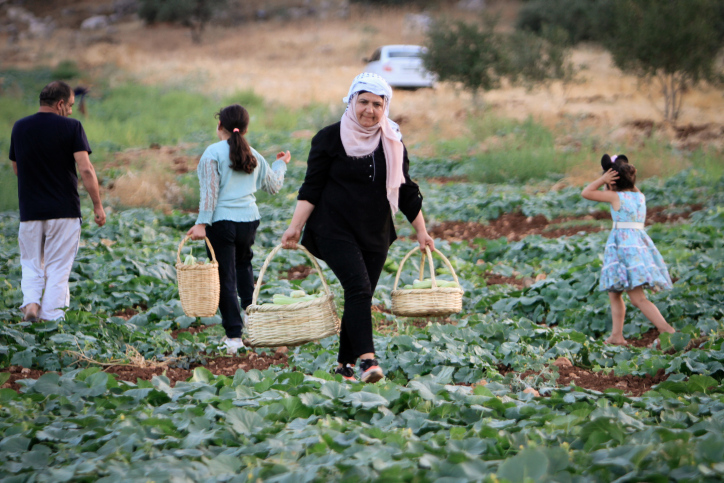
11.5% of residents within areas of the West Bank ruled by the Palestinian Authority make a living from agriculture. Malek Abu El-Failat, a member of the Hebron-based think tank "Tahaluf", which innovates in agriculture and environmental protection, came to the Arava Institute for Environmental Research in Kibbutz Ketura to search for technological solutions to agricultural problems in the West Bank.
A significant amount of the Authority’s land – about 20% of its territory or about 1.2 million dunams (465 square miles) – are cultivated for agriculture. These lands are often divided into family-run plots.
"In the Hebron area, the plots are small. Much of the agriculture is not advanced," said Abu Al-Failat. "There are diverse technologies available to deal with this, such as vertical farming, which allows for more produce on less land."
Agriculture is an age-old aspect of life in Israel and the West Bank, and the Palestinians see an economic, traditional and strategic need to preserve it. According to Abu Al-Failat, engagement in agriculture is increasing, and he associates this unexpected rise with programs which try to encourage young people to take up the vocation.
"There are many programs aimed at opening a door for young people to enter into agriculture. It is a government strategy."
The relationship between modern technologies and local, traditional farmers may raise some problems. But according to Abu Al-Failat "the economy is open to technologies. We are looking for advanced technologies that we can actually use. The traditional farmer will not use computer-based technology, but he will use tech which allows him to optimize his water usage. They need to be taught, and the technology itself needs to be adapted to its users."
“A farmer may not know chemistry, but there are organizations which specialize in making its applications accessible. These are generally non-governmental organizations, but the Palestinian Authority government is also involved," explained Abu Al-Failat. "The technologies come from Israel and the United States, and each one needs approval from the Ministry of Agriculture. Then the NGOs adapt it to our farmers and their fields.”
In 2014, the agricultural sector accounted for about 5.5% of the gross domestic product of the Palestinian Authority. Citing the lack of competition between Gaza and the West Bank, and the fact that intermediaries between farmers and the final distributor claim most of the profits, Al-Failat concludes that “despite the high prices, the farmer himself does not earn much."
But the main problem affecting the success of Palestinian agriculture according to Abu Al-Failat is access to resources. Since the West Bank is divided between Palestinian Authority, shared, and purely Israeli rule in Areas A, B, and C respectively, parts of Palestinians’ agricultural lands are controlled by Israel.
"There is land but it is not accessible. Most of the agricultural land is in Area C. We are afraid that irrigation systems and new technologies will be confiscated. With all the restrictions that exist we will not be able to find a sustainable solution. The farmers know, and although they may want to introduce new technologies, they feel they cannot."
Technological innovation may ease the problems of Palestinian agriculture, according to Abu Al-Failat, "The technology exists. What is needed is good planning and an enabling political atmosphere."
This article was translated from Hebrew by Hannah Blount.






